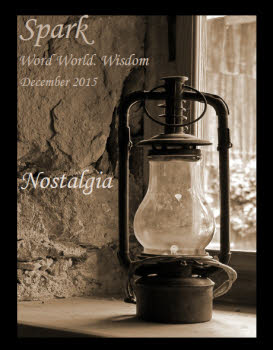by Chidambarakumari Ponnambalam
Vadagathimathil, South India. May 26th, 1944
As the crowd milling around her slowly thinned, Janaki looked around her. Her newly-wed husband Nambi was deep in conversation with his best friend Hameed. In their few days together, Janaki had gathered that Nambi had met Hameed when on their way to Ceylon to meet their business partners.
“Do you want something, mathini?”
Shaken from her reverie Janaki turned around to look at the lovely Zaira Banu, Hameed’s wife. She shook her head.
“If they start talking they will never stop. I am so glad Nambi Anna has finally settled down!” said Zaira. “I can’t wait for you to move in to in Calcutta. In fact…”
Before Zaira could complete her sentence the men joined them.
“Akka, I hope Zaira was extolling the virtues of Calcutta,” said Hameed. “We do miss our homeland terribly; in fact, it is our mutual love for Tamirabarani that has made Nambi and me this close.”
Nambi turned to Janaki. “If it weren’t for Hameed I wouldn’t be standing here beside you. Last year when I returned to Colombo I found my business partner had swindled me out of my share of profits and disappeared. I was banking on that money for my sister’s wedding and I did not know how to tell my family that we had lost all our money. Hameed lent me a huge sum without any conditions or interest. I still owe you for your timely help, Hameed.”
“Well, all that is water under the bridge, Nambi,” said Hameed, as they began to discuss when Nambi and Janaki would reach Calcutta.
Calcutta, East India. 1944- 1945
Mullick Street in BoraBazaar Market was a beehive of bustling activity. Janaki and Nambi soon settled into a beautiful rhythm. Every morning Nambi left to manage their store P.R Shanmugam & Sons, a joint venture he started with his friend Manickam, while Janaki busied herself with household chores and a bit of sewing.
On some days, Zaira who lived two houses away, dropped in for a morning chat and on other evenings the two young women walked around the Bazaar together exchanging childhood stories.
“I sometimes wish we were back in Tirunelveli. Do you like it here, Zaira?” asked Janaki on one of her visits.
“It was difficult initially, mathini. This part of Calcutta has very few Muslims. There weren’t many who wanted to rent their house to us but we managed to find this one because the landlord is Anna’s friend and that is how we were able to find this house. I guess that must be how the few Hindus who live in Melappalayam feel, alone and different. It took some getting used to but now I know this area so well I have slowly stopped missing Melappalayam.”
Weekends were spent visiting the Alipore Zoological Gardens or the parks with their friends, their baskets laden with typical South Indian picnic staples of puliyodhare and thayir sadham. You could take a man out of Tirunelveli but never Tirunelveli out of him.
Calcutta, East India. December 5th, 1945
Janaki stood on the railway station platform holding her firstborn Megammal. She pulled the shawl tighter around the baby, hoping to protect her from the cold. Nambi was busy unloading their luggage from the train.
“Alhamdulillah!” called out the familiar voice of Hameed, “Megammal is beautiful. I guess she takes after Akka and not you then, eh Nambi? Let’s first go home… I have managed to get a rickshaw with great difficulty and I don’t want to lose him.”
When the hand-rickshaw pulled in front of Nambi’s home on Mullick Street, Zaira and Lakshmi, Manickam’s wife, stood outside with an aarti plate to welcome the new mother.
As the ladies settled in with the new baby, the men stepped out.
“Newspapers said there were protests against the British in Bombay too. Is everyone we know safe? How is the store here?” asked Nambi.
“Everyone is safe but we had to close the store for more than a week,” sighed Manickam.
“It was a good thing you left early to Nellai, Nambi. Initially the protests were against the British forcing us to fight in the war. Then the Calcutta Tram Way Workers Union started their strike for better working conditions. Transport came to a complete standstill,” said Hameed, “and no Indian – whether he supported the British or not – was really safe. As soon as the Corporation workers decided to stop working on November 24th, we had water shortage added to our never ending list of woes. There was no one to work at the Mullick Ghat Water Pumping Station.
“Zaira wanted to go back to Melappalayam. But how could we go? Transport was non-existent. Governor Casey ordered the Army to take over the work of all the water pumping stations and now we have water, ”Hameed continued in a low voice.
“Do you plan to go back now that the transport is normal?” asked Nambi.
“Strike or not, my handloom business is doing well, so I don’t want to go just yet. In any case, which city is safe from protests now? Hopefully all these protests will lead to something fruitful,” answered Hameed.
“Manickam, since I had more time back home I managed to secure us a new order with a jaggery seller in Rajapalayam. Our jaggery load will start coming in early August. Hopefully this will energise our business as well, “said Nambi.
Calcutta, East India. July 17th, 1946
All across the country there was an undercurrent of unrest and restlessness, more so in Bengal. Indian National Congress had accepted the 1946 Cabinet Mission’s proposal to transfer power from the British Raj to Indian leadership but the Muslim League had proposed an alternate plan along communal lines – a Hindu India and a Muslim Pakistan. The leader of Indian National Congress, Jawaharlal Nehru had rejected this proposal.
Back in the Nambiapillai household, Nambi, Hameed and their families were spending a quiet afternoon at home in the sultry weather, when the radio crackled into life.
“…The Muslim League denounces the Cabinet Mission Plan. Muhammed Ali Jinnah, leader of the Muslim league has announced his intent to create Pakistan and announced that he is prepared to launch a struggle to achieve it. During his press conference, Mr. Jinnah has declared August 16th as Direct Action Day and has called for…” the newscaster’s voice was drowned in a toddler’s unbridled laughter.
Nambi snapped from his musings and looked at his friend.
“What does this mean? Should we pack up and leave?” asked a nervous Zaira.
“Don’t worry Zaira. He just asked every Muslim to protest not fight a war. There will be a strike, the leaders will talk and everything will be okay,” answered Hameed, but without his usual air of confidence.
Janaki closed her eyes and prayed to her favourite Nellaiappar. Won’t the God who saved his devotee’s field of rice from rains protect this city? Didn’t Gods everywhere speak to each other? Somehow she was sure her Gods would keep them all safe.
Calcutta, East India. August 16th, 1946.
Direct Action Day
The Bengal Province, the only one ruled by a Muslim League government, declared August 16th as a public holiday, with Muslim protestors planning to march across all neighbourhoods. Being a Hindu majority neighbourhood, the Bora Bazaar community had decided to defy the hartal and keep their shops open.
Manickam and Nambi had decided to close their store just to avoid trouble. A week earlier, Nambi and Janaki had convinced Hameed’s family to move in with them as a precaution. They told the landlord Hameed’s family was travelling back to their hometown and moved in the night to avoid any suspicion.
“Isn’t your load of jaggery coming in this week Nambi?” asked Hameed.
“It should already be at the railway station. Hopefully the protestors will march peacefully to their rally and we can resume our normal lives,” said Nambi.
They sat huddled by the radio and as the hours passed, it was apparent that nothing was ever going to be normal.
Against everyone’s warnings, Nambi stepped out to check his neighbourhood.
An unreal world was awaiting him beyond his threshold. Shuttered doors, broken glasses, burning carts and bleeding men greeted him. As rumours spread faster than wildfire, he saw truckloads of Hindu men wielding lathis and iron bars leave towards Muslim neighbourhoods in East Bengal.
Nambi broke into a run towards his home. Back at home, as Nambi recounted what he had seen, as Janaki calmed Zaira. Hameed paced back and forth like a caged jungle cat.
“This city is no longer safe for your family, Hameed. We should plan your escape to Thirunelveli at the appropriate time,” said Nambi.
That night as their friends slept, Janaki whispered to Nambi, “We need money to give them. We invested all our savings in that jaggery order. Where can we get money now?” Nambi calmed his wife down, saying he was coming up with a plan.
The next few days passed in a blur as the death toll steadily rose. First came the riots and then the rains. Finally when the sun came out, they all stepped out – one big family of Tamizh Brahmins on their way to Howrah Station. Nambi made sure both Hameed and Hanif wore a sacred thread and had vibuthi on their foreheads. Janaki and Zaira were dressed alike in silk sarees with a big red bindi.
Howrah Station was a throbbing sea of people, everyone clamouring for a seat to take them away from the burning inferno that was Calcutta.
“Hameed, please go and visit Janaki’s brother once you reach Madras. Hand them the letter I have given you and they will definitely help you. I sent them a telegram so they will be expecting you,” said Nambi.
And as Zaira reached out to Janaki to thank her, Janaki removed her gold bangles and placed them in Zaira’s hands. Her protests were lost in the train’s loud whistle. Hameed’s eyes welled as the train slowly inched away. Even as their business lay in a big pool of wasted jaggery somewhere close by, Nambi watched the moving train carrying his friend and knew his best investment was safe.






